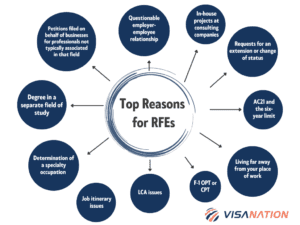H-1B Sponsorship by Small Companies
The H-1B visa is available to anyone who gets a specialty job with a U.S. company. However, even if a company technically qualifies for the H-1B, not all situations are the same. For small businesses, there are some hurdles that need to be overcome before committing to this visa path for a worker. For workers, it is important to know these hurdles to effectively choose an employer that can see the process all the way through. In this post, we’ll address the main question, “can a small company sponsor an H-1B visa?”
How The H-1B Works
If you are new to the world of immigration law altogether or new to just the H-1B visa, here is a rundown of what goes into this popular work visa.
To get an H-1B, you must have a full- or part-time job offer from a U.S. employer for a specialty position that requires a bachelor’s degree. You must also have the required degree. Because the barrier to entry is so low, there has been an influx of petitioners over the past several years. To manage this, the USCIS has instituted an annual lottery for the H-1B in which 85,000 total petitions are randomly selected to go on to processing. All petitions not selected are returned along with their fees and you will need to wait until the next year to file again.
Now, there are ways to get around this lottery and file a cap-exempt petition. These include:
- Having a cap-exempt employer (i.e. institute of higher education, nonprofit associated with an institute of higher education, or governmental research center)
- Filing to extend your status on an H-1B visa
- Filing to transfer your H-1B status to another employer
In any of these cases, your petition will not be entered into the cap and will go straight to processing. In all other cases, you will have to file the petition as soon as the lottery window opens on March 1.
The petition (an I-129 form) needs to be filed along with a Labor Condition Application, any necessary supporting evidence, and the required fees. Keep in mind that the employer is responsible for filing these items and fees and it is not legal to have the beneficiary pay or file.
If the petition is subject to the cap and is selected in the lottery, then it will go on to processing, where it will be either approved, denied or rejected. If it is approved, then the employee will not be able to start working until October 1st of the year that the petition was filed.
H-1B sponsorship can be a monumental task to undertake for small companies given the complexity of the process. Small businesses and startups are facing problems regarding complications with the amount of resources and documentation required to hire highly skilled foreign workers. As documented by the recent Wall Street Journal article, many small companies are looking for talented individuals, but cannot compete against larger, recognized companies when applying for H-1B visas.
In fact, the Brookings Institution found that essentially 70% of H-1B applications filed do not go beyond the preliminary stage of the process, many of which are small businesses. In the length of time it takes for small companies to complete the necessary forms for their skilled worker, the amount of visas available drops drastically. Every year, 65,000 H-1B visas are made available for first-time applicants and an additional 20,000 for higher degree holders, but in past years that quota was met five days after the application date. Many small businesses are advocating a higher quota or seeking a simpler application process that wouldn’t dedicate as much time and resources.
Leading technology companies have advocated for an increase in H-1B visas to Congress members. Companies such as Microsoft Corp, Intel Corp, and Facebook Inc. are some of the few that are raising awareness to the cause. Even though Senate lawmakers have approved an annual H-1B cap increase, small business employers still face the disadvantage of competing against major technology companies in attracting H-1B talent.
Challenges to Small Companies
Many small businesses and startups are incapable of providing the resources and funds necessary to complete the H-1B hiring process. Many small firms have routinely given up the idea of hiring H-1B workers because of the high risk of rejection.
Small businesses and startups are searching nationally and internationally for the best talent to fit the skill set and experience necessary for them. Alden Zecha, the chief financial officer of Sproxil, Inc said, “we’re looking for qualified individuals, and if they’re U.S. nationals, that would be easier for us.” Mr. Zecha hopes that a portion of H-1B visas can be segregated just for smaller business and startups in order to eliminate the competition against large employers.
Requirements for Employers
The basic requirements are that the employer must have the financial resources to pay the employee, they must demonstrate that they do not intend to displace U.S. workers and that the H-1B employee will be working at the worksite they specify in the filing. For small companies, the burden lies on them to proof to USCIS that they have the financial stability to support the employee during their period of employment. This can be done by showing balance sheets, income statements, tax returns, work contracts, etc. While the H-1B visa is a great option due to its streamlined process, it may not always be the most appropriate or feasible option for small businesses. Discuss other alternatives as a backup option with your immigration attorney.
The LCA
The Labor Condition Application is a document obtained from the Department of Labor that obligates the employer to make four attestations:
- That there are no strikes or lockouts taking place at the beneficiary’s proposed place of work (essentially that he or she is not replacing striking workers)
- That hiring the beneficiary will not negatively impact the employer’s current workforce
- That the current employees have been notified of the employer’s attempt to hire the beneficiary
- That the employer will pay the beneficiary the prevailing wage as a minimum, a wage determined by the Department of Labor based on the position and the geographic location of the work
While the LCA is instituted to protect the current U.S. workers, it can present a problem for small companies, particularly that final attestation. An employer needs to be able to prove through bank statements and tax documents that they are capable of and prepared to pay the prevailing wage to the beneficiary. For small companies and startups, this can be a very difficult thing to prove.
The Cost
Many small businesses don’t recognize the cost that is involved with hiring an H-1B worker. Here are the fees for a small company as of the writing of this post:
- $460 I-129 filing fee
- $750 ACWIA training fee for companies with fewer than 26 employees
- $500 Fraud prevention fee
Other fees include the $4,000 Public Law fee, which is only applicable to companies with more than 50 employees, and the $2,500 premium processing fee, which is optional.
These fees may be a drop in the bucket to a larger company, but can easily be a burden on the fledgling budget of a smaller business. Also, if the petition is not approved (for example, if you attempted to petition without the help of an attorney and it was determined that you are unable to pay the prevailing wage), then all of those fees are lost and not refundable. So consider the expense of this process before beginning the immigration journey.
Self-Petitioning
For those that are interested in petitioning for themselves through a company that they own or plan to start, you may be in for a rude shock. There is absolutely no way to self-petition for the H-1B visa. If you are the sole proprietor of your company, you cannot obtain H-1B status through it. This is because a valid employer-employee relationship must exist in which the employer has the right to control the employee’s tasks, salary, and employment status.
However, this is not to say that working for your own company while under H-1B status, starting your own company, or having your company petition for you is impossible. In 2011, the USCIS released a memorandum that clarified this principle. You are permitted to do these things within the bounds of your own business as long as a separate entity fulfills the role of your employer. If a CEO or board of directors has the power to hire and fire you, change your salary, and control your duties, then they can petition on your behalf, allowing you to work for your own company on H-1B status.
Because this is such a complex and relatively confusing process, it’s best to seek professional legal help from an attorney before attempting this.
Green Card
Additionally, for small businesses, keep in mind that many H-1B holders use this visa as a stepping stone to an employment-based green card. Like the H-1B, the process for getting a green card is difficult and costly. If you are not prepared to sponsor your H-1B employee, understand that he or she will likely look elsewhere for sponsorship during their employment with you.
Frequently Asked Questions
Below you will find answers to the most commonly asked questions about this topic:
Does a startup have to have tons of money in the bank in order to go through the H-1B process?
Not necessarily, however this is something you should thoroughly discuss with your immigration attorney. If you are able to demonstrate that there is tangible expected income from upcoming projects and the need for employees that won’t displace qualified U.S. workers that can be enough to make your case.
Is a new startup able to file H-1B visas?
The age of the company is not the determining factor assuming they meet the other requirements (including having an IRS tax number) and can demonstrate a need for the employees.
What is an RFE?
An RFE is a Request for Evidence for the H-1B petition. In other words, USCIS needs more information to be able to make a decision on your case. Below are some of the top reason for RFEs to be issued. These can include include:
- Determination of a specialty occupation
- Petitions filed on behalf of businesses for professionals not typically associated in that field
- Degree in a separate field of study
- Questionable employer-employee relationship
- Requests for an extension or change of status
- LCA issues
- Job itinerary issues
- Living far away from your place of work
- AC21 and the six-year limit
- F-1 OPT or CPT
- In-house projects at consulting companies
It’s important to submit your response before the deadline period ends. If you miss the deadline date then you’ll likely receive a denial at which point you’ll have to file a motion to reopen the case. In any event, VisaNation Law Group attorneys have an excellent track record of responding to RFEs and securing approvals for our clients.
How VisaNation Law Group Immigration Attorneys Can Help
Embarking on any immigration journey without the help of an expert is inadvisable. Just like you would hire a contractor to perform an inspection or a realtor to sell a home, an immigration attorney is there to protect your investment. Sponsoring someone for a visa is a long, complicated, and expensive process. Getting a lawyer can help you make sure that it’s done right the first time.







